By night train from Berlin to Moscow
It can be called an expedition of exploring to the east which members of the passenger association of TreinTramBus from Belgium, Rover from the Netherlands and Fahrgastverband PRO BAHN from Germany did in May 2018. Actually it was an educational trip of the European Passengers’ Federation (EPF) focused on the topics public transport and its potential in Russia.
The expedition began in Berlin where the delegation started with the Swift – one of the new services of Russian Railways (RŽD). Due to construction works this train departed from Berlin-Lichtenberg instead of Berlin Ostbahnhof and moved to the east. It connects the four European capitals Berlin, Warsaw, Minsk and Moscow. The journey takes nearly 23 hours and can be done in comfortable sleepers with 2-bed compartments as well as individual shower and toilet; in 4-bed couchette coaches with washing facilities and lavatories at the end of the coach and in reclining seats. There are a dining car and a bar for the passengers’ comfort and open throughout the entire journey.
The gauge changing took place in the early morning of the next day. In former times it was a sensation but nowadays it is hardly noticeable for the passengers. In Brest, there is a gauge change facility to change from the European standard gauge to the Russian broad gauge. Here the coaches are slightly lifted and the bogie is changed with help of permanent water-cooling. During this process the train is pulled at a speed of 5 – 8 km/hour through the complex. Inside the coaches the passengers nearly do not see anything of that hi-tech process. The delegation of the EPF got the unique chance to watch that changing directly in the facility. With help of the experienced guidance of Eugenio Makhlay, Talgo manager, they got an impression of the simple but very effective technology which allows faster journey times. Mr Makhlay summed up the benefits of that technology, “No balderdash. Works always and is as simple to handle as a Kalashnikov.” The next hit on the plan was the presentation of the Swift train from inside by the train manager. Proudly he presented and explained everything from on-board entertainment programmes to power supply.
In the evening, the delegation arrived relaxed in Moscow and was warmly welcomed by Kirill Yankov, the chairman of the Russian passenger association SOPASS, which is a member of EPF. They started immediately with a short sightseeing tour through Moscow starting at the famous Red Square. The following day, the delegation visited the RŽD headquarters. They met Mr Oleg Nikitin, deputy managing director of the federal passenger company. According to the positive experience during the journey to Russia by train various topics were discussed such as development potential for reducing travelling times from western Europe to Russia, improved supplies for night trains and shortening the time of passport controls at borders. Mr Nikitin expressed clearly his ideas of connecting Russia with different European and Asian capitals and centres. Finally the EPF delegation got the unique chance to have a look at the central traffic control. They were deeply impressed by the amount of data processed in maps and statistics as well as by the surprisingly high rate of punctuality of 95%. In relation to the size of the country that is an amazing result.
Exactly that accuracy was demonstrated during a short and informative guided tour at the Leningrad Station in Moscow and the departure of the train to Tver. Tver? Why Tver? Tver is located at the railway line between Moscow and St Petersburg. It can be reached by a new type of trains called Swallow which are produced by Siemens Desiro RUS in a joint venture with Sinara in Verkhnyaya Pyshma near Yekaterinburg. The Tver Carriage Works (TCW) produces a great variety of coaches for short, middle and long distances. There is a small museum about the company showing some interesting models of typical trains produced in Tver since 1898. The delegation enjoyed a guided tour through the museum and the factory. They had a closer look at the very new double-deck passenger coaches with restaurant and kitchen on board. At last a picture of the delegation and its hosts from TCW was taken in front of the impressive and innovative memorial of a diesel electric train set with jet propulsion. Unfortunately it was never manufactured because of its enormous weight and technical problems.
The journey continued and in St Petersburg there were even more possibilities to get to know the latest products of Siemens Desiro RUS and Velaro RUS for the Russian market. But it was a new perspective. Trains like Sapsan – the Russian word for Peregrine Falcon – and Swallow are maintained here regularly. Mr Bittner, Siemens expert for the maintenance of these trains, explained the process from electronic check of bogies to varnishing.
What else can be told about public transport in Moscow, Tver and St Petersburg? Metro stations in Moscow are always an eye-catcher and do not fail to impress tourists from abroad. Exquisite decoration as well as absolutely close arrival and departure times of trains in stations, which means 90 seconds in rush hours, surprise even international experts of public transport systems. A perfect combination between art and transport is represented by the Aquarelle Train which runs on regular metro lines and displays reproductions of Russian art. Seats were removed to give room to the exhibition and that is remarkable in view of the number of passengers every day. But the project has been a success for more than 10 years now and there seem to be lots of art fans among passengers. The only problem is to find out when and on which line the Aquarelle Train runs. It must be mentioned that there is another curiosity in Moscow’s public transport system: the monorail train. Unfortunately time is running out for that means of transport on pillars. For Moscow’s needs it is too slow and maintenance turned out to be very expensive.
City transport in Tver is a shock due to market-based services. Obviously the competition between bus and tram services leads to a fight for passengers and some drivers become Niki Lauda style formula-one drivers. Fair regulations for ecological transport with tram trains and trolleybuses as well as consistent tariffs and well-arranged transport information are urgently needed in the competition between public and private transport.
St Petersburg offers with Admiralteyskaya station the deepest metro station at 86 meters under the ground. And it has got a very dense net of trams, trolleybuses and buses. If you are interested in the good old times of public transport, visit Vitebsky Station which is decorated completely in art nouveau style and is a feast for the eyes. Long distance trains to Belarus, Ukraine and the Baltic States start at the station. Moreover the tram museum is a must-have-seen. Transport classics from Soviet times and specifics such as the ice-tram and the longest tram which was built in 1989 can be seen there.
Exploring all these means of transport and different sights cannot be described without mentioning the precious exchange of experience with the representatives of the Russian passenger association SOPASS and with friends and experts of public transport in Moscow, Tver and St Petersburg. Special thanks must be given to Mr Konstantin Ponomaryov and Mr Vladimir Valdin who enriched the excursions with their deep knowledge about local public transport from passengers’ as well as organizational sides.
Soon it turned out that a lot of common interests exist. Among them there are customer demands for better information systems, comfort on board and services offered in public transport. Travelling broadens your mind. That is a common phrase which fits perfectly. The special situation of such a vast country and urban centres like Moscow and St Petersburg must be taken into account if you want to evaluate Russia and Russian transport systems. According to these impressions and conclusions the delegation can underline Dostoevski’s (Russian writer, 1821 – 1881) words, “The Russian reality is an illustrious, universal, tidy chaos.”
Jörg Bruchertseifer
Fahrgastverband PRO BAHN
Vice chairman


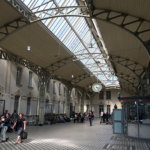
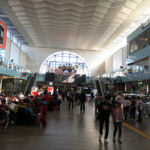
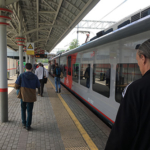
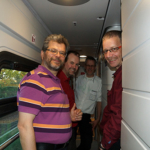
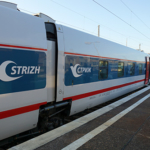
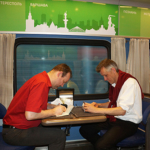
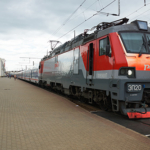
 Stay informed!
Stay informed!